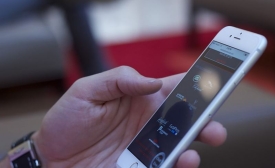digital diplomacy
A day after President Dilma Rousseff squeaked out a close electoral victory, Brazilian voters vented their frustrations one way they know best: on social media. Online debates between supporters of the president and her unsuccessful rival Aécio Neves were hostile, in a country with one of the world’s deepest penetration of social-media use.
“It is only when we contest (ISIS') presence online, deny the legitimacy of the message it sends to vulnerable young people and expose (ISIS) for the un-Islamic cult of violence it really is ... that (ISIS) will truly be defeated,” Allen said.
Watch this panel discussion hosted by Tech@State earlier this month focusing on Mobile Diplomacy. Participants included speakers from the U.S. Department of State, Peace Corps, Ushahidi and USAID.
The United States is pressing Arab nations and other allies to do more to counter the Islamic State group's slick propaganda campaign, with a top American envoy on Monday describing efforts to combat the extremist messages as a vital pillar in the fight to defeat the group.
Activists in other countries who led their own Arab Spring movements said they were “jealous” of Tunisians Sunday. “We voted in Egypt but we lost our Arab Spring,” said Khaled Mansour, a student in Alexandria who took part in the 2011 protests.
Britain’s Queen Elizabeth II sent her first ever tweet during a visit to a museum Friday, signing it “Elizabeth R” - and even removing a glove to post it. Another tweet on the same account shortly afterwards said that the previous one was “sent personally by The Queen”, adding its own hashtag for the event -- #TheQueenTweets.

Sarah Myers West, an alumna of the USC Masters of Public Diplomacy program, recently published an article in the Hague Journal of Diplomacy titled, "Redefining Digital Diplomacy: Modelling Business Diplomacy by Internet Companies in China"

The power and relevance of new media in today's hyper-connected, globalized world were at the center of this week's public diplomacy news.







